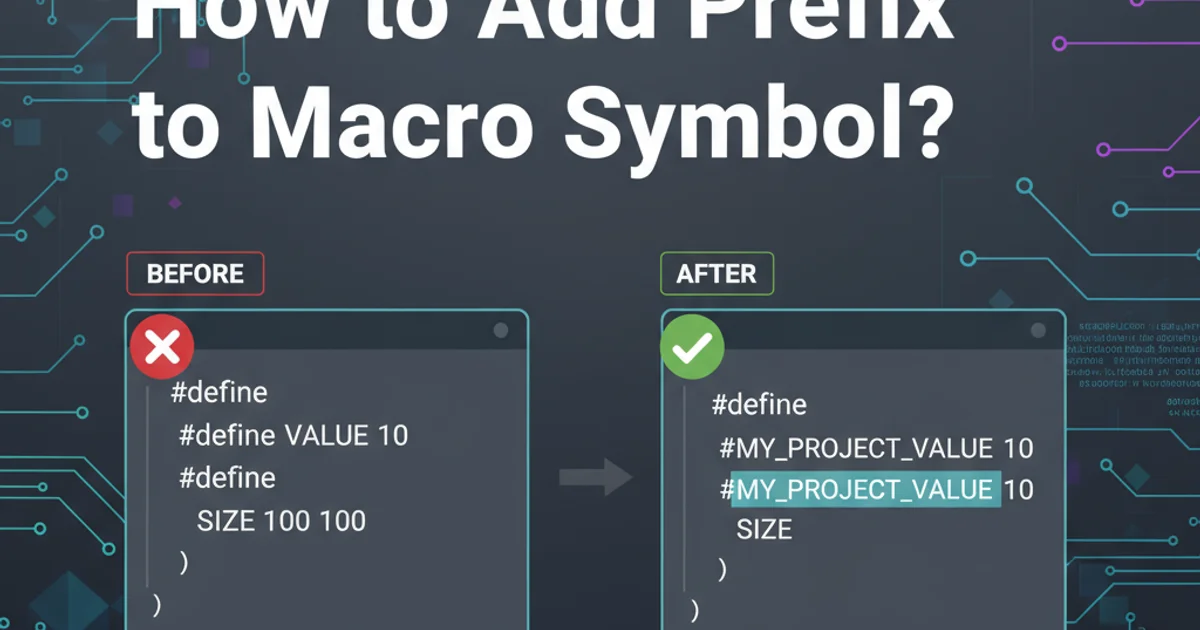How to add prefix to macro symbol?
Categories:
How to Add a Prefix to Macro Symbols in C/C++

Learn effective techniques to add prefixes to macro symbols, preventing naming conflicts and improving code organization in C and C++ projects.
In C and C++, macros are powerful tools for code generation and conditional compilation. However, their global scope can easily lead to naming conflicts, especially in large projects or when integrating third-party libraries. Adding a consistent prefix to your macro symbols is a common and effective strategy to mitigate these issues. This article explores various methods to achieve this, from manual prefixing to more advanced techniques using nested macros and preprocessor tricks.
The Problem: Macro Naming Conflicts
Macros operate at the preprocessor level, meaning they are textually substituted before compilation. Unlike functions or variables, they don't respect namespaces or scope rules. If two different parts of your codebase (or a library you include) define a macro with the same name, the preprocessor will use the last definition it encounters, leading to unexpected behavior, compilation errors, or subtle bugs that are hard to diagnose. A common scenario is when a library defines a generic macro like MAX or COUNT, which might clash with your own definitions.
flowchart TD
A[Start Preprocessing] --> B{Macro 'FOO' Defined?}
B -->|Yes| C[Use 'FOO' Definition 1]
B -->|No| D{Macro 'FOO' Defined Later?}
D -->|Yes| E[Use 'FOO' Definition 2 (Conflict!)]
D -->|No| F[Macro 'FOO' Undefined]
E --> G[Compilation Error / Unexpected Behavior]
C --> H[Continue Compilation]
F --> HIllustrative flow of macro naming conflict resolution by the preprocessor.
Method 1: Manual Prefixing
The simplest and most straightforward approach is to manually add a unique prefix to every macro you define. This requires discipline but is highly effective. Choose a prefix that is unlikely to clash with other symbols, often related to your project or module name.
#ifndef MYLIB_COMMON_H
#define MYLIB_COMMON_H
#define MYLIB_MAX(a, b) ((a) > (b) ? (a) : (b))
#define MYLIB_VERSION "1.0.0"
#define MYLIB_ENABLE_FEATURE
#endif // MYLIB_COMMON_H
Example of manual macro prefixing.
Method 2: Using Nested Macros for Automatic Prefixing
For more complex scenarios or when you want to define a set of related macros with a common prefix without typing it repeatedly, you can use nested macros. This technique involves defining a base prefix macro and then using it within other macro definitions. This approach leverages the preprocessor's expansion rules.
#ifndef MYLIB_ADVANCED_H
#define MYLIB_ADVANCED_H
// Define the base prefix
#define MYLIB_PREFIX(name) MYLIB_ ## name
// Use the prefix macro to define other macros
#define MYLIB_MAX(a, b) MYLIB_PREFIX(MAX_IMPL)(a, b)
#define MYLIB_PREFIX(MAX_IMPL)(a, b) ((a) > (b) ? (a) : (b))
#define MYLIB_VERSION MYLIB_PREFIX(VERSION_STRING)
#define MYLIB_PREFIX(VERSION_STRING) "2.0.0"
#endif // MYLIB_ADVANCED_H
Using a nested macro MYLIB_PREFIX to automatically add prefixes.
The key here is the ## preprocessor operator, which concatenates tokens. When MYLIB_MAX(a, b) is expanded, it first expands MYLIB_PREFIX(MAX_IMPL) to MYLIB_MAX_IMPL, and then that macro is expanded to its definition. This two-step expansion is crucial for the ## operator to work correctly with macro arguments.
##). The order of expansion can be tricky. Ensure that the macro containing ## is fully expanded before its result is used as another macro's name. Sometimes an extra layer of indirection is needed.Method 3: Conditional Prefixing with _Pragma or Compiler-Specific Attributes
While not directly adding a prefix to the macro name itself, some advanced techniques allow you to control macro behavior or visibility in ways that can prevent conflicts. For instance, using _Pragma (C99/C++11) or compiler-specific attributes can sometimes suppress warnings or enforce certain behaviors, though this is less about prefixing and more about managing macro impact.
#ifndef MYLIB_PRAGMA_H
#define MYLIB_PRAGMA_H
// Example: Temporarily disable a warning around a macro definition
#if defined(__GNUC__) || defined(__clang__)
#define MYLIB_PUSH_WARNING _Pragma("GCC diagnostic push") _Pragma("GCC diagnostic ignored \"-Wmacro-redefined\"")
#define MYLIB_POP_WARNING _Pragma("GCC diagnostic pop")
#else
#define MYLIB_PUSH_WARNING
#define MYLIB_POP_WARNING
#endif
MYLIB_PUSH_WARNING
#define MYLIB_GENERIC_MACRO 10 // This might conflict, but we're managing warnings
MYLIB_POP_WARNING
#endif // MYLIB_PRAGMA_H
Using _Pragma to manage warnings around potentially conflicting macros.
This method doesn't add a prefix to the macro name, but it demonstrates how you might use preprocessor features to manage the environment around macro definitions, which can indirectly help in conflict resolution by allowing you to temporarily ignore certain issues. However, direct prefixing remains the most robust solution for preventing name clashes.
enum class or constexpr variables instead of macros for constants, and inline functions or templates instead of macros for small functions. These C++ features offer type safety and scope control, eliminating many macro-related issues.